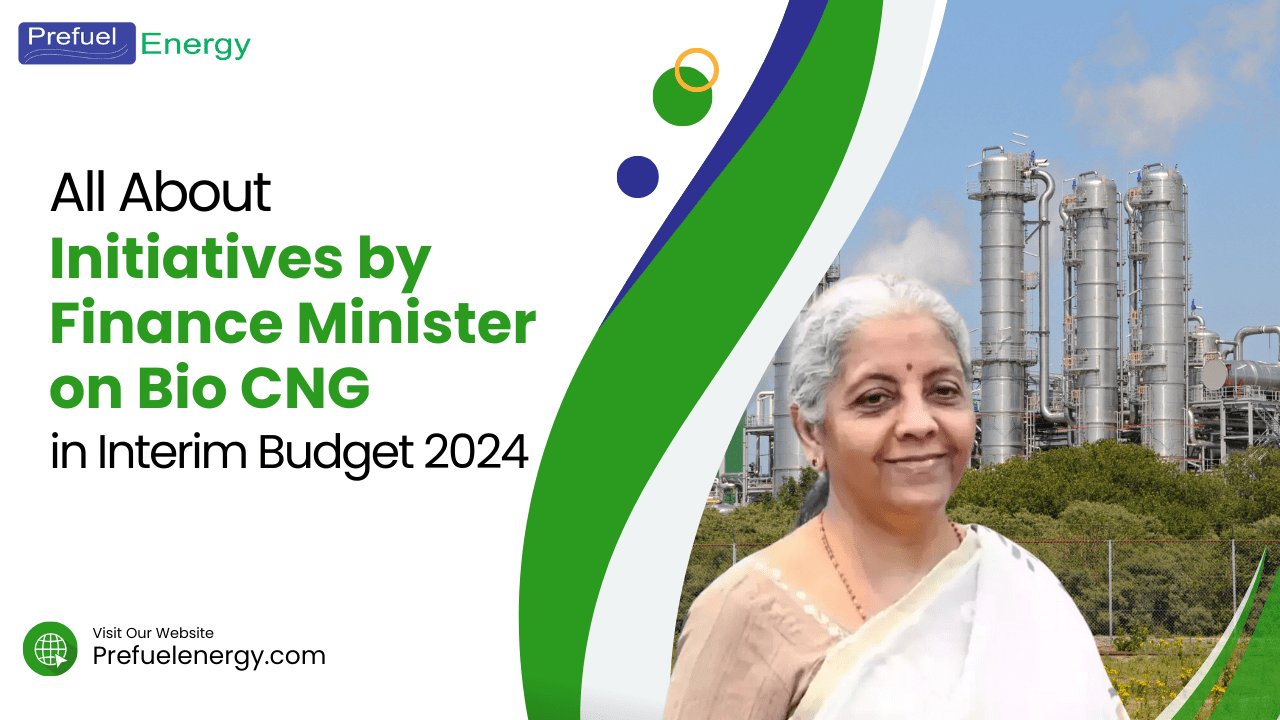Bio CNG or compressed biogas is a renewable form of natural gas produced from agricultural and other organic waste materials like crop residue, cattle dung, sugarcane press mud, municipal solid waste etc. Through the process of anaerobic digestion, biogas is produced which is then purified to remove carbon dioxide, hydrogen sulfide and water vapor. The resulting gas, which is high in methane, can be compressed and used as a green fuel alternative to conventional fossil fuel based compressed natural gas (CNG).
Table of Contents
Benefits of Bio CNG
Using bio CNG has several benefits:

- It is a renewable, carbon-neutral fuel that helps reduce greenhouse gas emissions and dependence on imported natural gas
- Helps manage agricultural waste and prevent open burning of crop residue like paddy straw
- Produces a nutrient-rich digestate that can be used as organic fertilizer for crops
- Supports the waste-to-wealth circular economy, providing additional revenue streams for farmers
- Can be blended with CNG for use as a transportation fuel for vehicles
Government Initiatives to Promote Bio CNG
Recognizing its benefits, the Indian government has been actively promoting bio CNG production and use under the Sustainable Alternative Towards Affordable Transportation (SATAT) initiative:
- The initiative aims to establish 5,000 compressed biogas plants across India by 2023 with a production target of 15 million metric tonnes
- Financial incentives like capital subsidies, tax waivers, off-take guarantees and concessional loans are being provided
- Blending targets for compressed biogas in CNG have been introduced starting at 2%
Recent Developments
- In January 2024, Uttar Pradesh Chief Minister Yogi Adityanath inaugurated a compressed biogas (CBG) plant at Sainjani village in Budaun district. The 50-acre Rs 133 crore facility can process 100 metric tonnes of paddy straw daily to produce 14.25 metric tonnes of CBG. This will prevent stubble burning over 17,500-20,000 acres of farmland. [2]
- In January 2024, Union Minister for Petroleum and Natural Gas, Hardeep Singh Puri announced that 100 new biogas plants will be set up in Uttar Pradesh soon. So far, land has been identified for establishing 37 plants with active support from the state government. [10]
- In June 2023, HPCL successfully commissioned a flare stack system at its CBG plant in Budaun to manage the raw biogas produced before its cleaning and compression. This makes HPCL the first PSU to start commercial scale bio CNG production. [12]
The recent push for bio CNG plants and infrastructure is expected to give a major boost to the production and adoption of this renewable transportation fuel in India.
Additional Key Stats and Details:

- As of 2024, there are over 2,500 bio-CNG plants operational or under construction across India, with an estimated production capacity of over 20 million tonnes per annum [1]
- The SATAT initiative aims to establish 5,000 compressed biogas plants by 2023 with a targeted production capacity of 15 million metric tonnes per annum [2]
- According to estimates, compressed biogas production in India has the potential to reach over 60 million metric tonnes per annum in the future[3]
- Becoming a bio-CNG retailer can offer good margins, low risks and the opportunity to enter the growing renewable energy sector
- The government offers various incentives like capital subsidies, tax benefits and guaranteed off-take of production
- Entrepreneurs need to have land meeting the minimum space criteria along with proof of ownership to be able to apply
- Priority is given to those with prior experience in similar energy businesses as well as strong financial capacity
Initiatives by Finance Minister in Interim Budget 2024
- Phased Mandatory Blending of Compressed Biogas (CBG) in CNG and PNG: To promote the use of bio CNG as a transportation fuel, the government will implement a phased mandatory blending of CBG in CNG and piped natural gas (PNG) for domestic use. This move aims to reduce dependence on fossil fuels and promote the use of renewable energy sources.
- Financial Assistance for Biomass Aggregation Machinery: To support the supply side of biogas production, the government will provide financial assistance for the procurement of biomass aggregation machinery. This will help farmers and entrepreneurs collect and aggregate agricultural and organic waste materials, which can then be processed into biogas.
- Coal Gasification and Liquification Capacity: The government plans to set up a coal gasification and liquification capacity of 100 million metric tonnes by 2030. This initiative aims to reduce imports of natural gas, methanol, and ammonia, thereby promoting energy security and reducing greenhouse gas emissions.
Benefits of Bio CNG Dealership and Franchisee:

- Low Investment and High Returns: Bio CNG dealerships and franchises offer relatively low investment costs compared to traditional fuel stations. With the growing demand for bio CNG, there is potential for high returns on investment.
- Government Incentives: The government provides various incentives to bio CNG dealers and franchisees, including capital subsidies, tax benefits, and guaranteed off-take of production. These incentives make it an attractive business opportunity.
- Environmental Impact: By promoting the use of bio CNG, dealers and franchisees contribute to reducing greenhouse gas emissions and improving air quality. This aligns with the government’s commitment to sustainability and environmental protection.

How to Apply for Bio CNG Dealership and Franchisee:
- Eligibility Criteria: To apply for a bio CNG dealership or franchisee, entrepreneurs need to meet certain eligibility criteria, such as having land meeting the minimum space requirements and proof of ownership. Prior experience in similar energy businesses and strong financial capacity are also advantageous.
- Application Process: Interested individuals can apply for bio CNG dealership or franchisee opportunities through the respective oil marketing companies (OMCs) or state-owned energy companies. The application process typically involves submitting a detailed project proposal, financial statements, and other relevant documents.
- Selection Process: OMCs and energy companies evaluate applications based on various factors, including the applicant’s experience, financial capabilities, and the feasibility of the proposed project. Selected applicants are then granted dealership or franchisee rights to operate bio CNG facilities.


